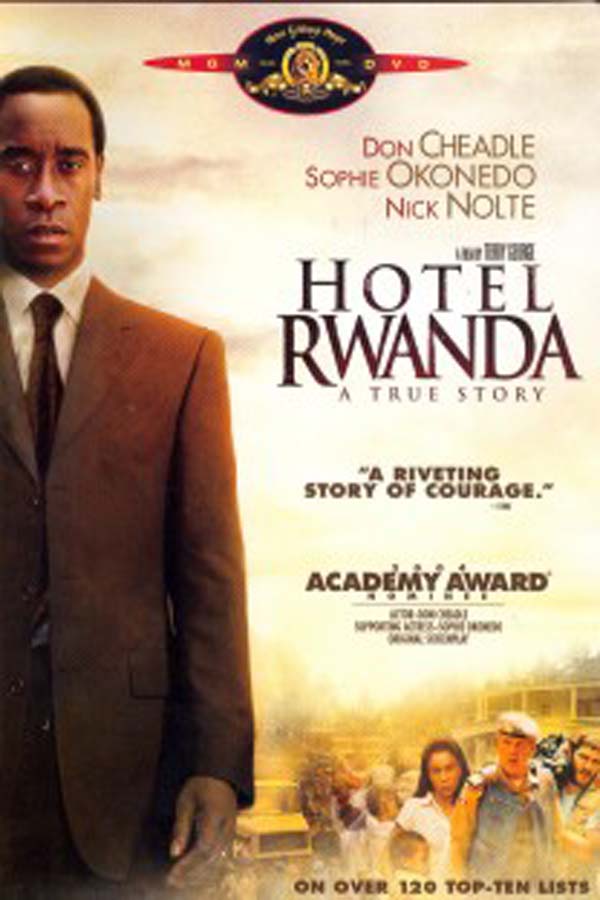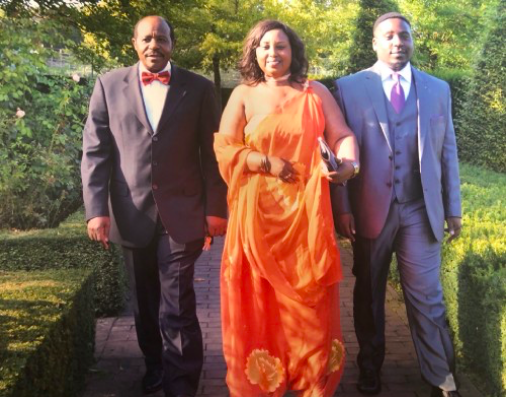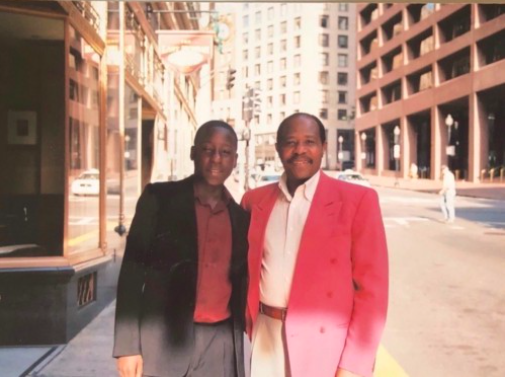By Tresor Rusesabagina
My name is Tresor Rusesabagina. I’m the son of Paul Rusesabagina, an internationally beloved human rights hero whose incredible story you likely heard in the film Hotel Rwanda. During the Rwandan genocide, he was the manager of Hôtel des Milles Collines The hotel, notably, was Belgian state-owned property, associated with Belgium’s Sabena Airlines. As a bloody and brutal war that claimed the lives of 800,000 people raged outside, he prevented the Belgian-owned hotel itself from being destroyed and saved more than 1,200 people by providing them safe harbor. This stunning act of bravery and compassion captivated people from around the world, leading to the Oscar-nominated film about the dramatic events being created.

Paul Rusesabagina (Portrayed by Don Cheadle), a hotel manager, houses over a thousand Tutsi refugees during their struggle against the Hutu militia in Rwanda, Africa
Since then, my father has been an outspoken humanitarian activist. He has dedicated his life to speaking out against oppression and fighting for freedom and human rights across the world. His work has changed society as we know it and he has been honored with numerous awards, including the Presidential Medal of Freedom in 2005. But his work has come with grave consequences. As I write, he is currently illegally detained in Rwanda after being kidnapped a month ago while traveling for humanitarian work in Dubai.
Not everyone is thrilled with the idea of humanitarian progress — in fact, some people are openly threatened by it, and that very much includes Rwanda’s President Paul Kagame. The Rwandan government rarely keeps it a secret when they perceive someone as a threat and usually subjects them to harassment, intimidation, coercion, and even detainment, torture, and assassination. There have been many documented instances of this, and my family has always been keenly aware of their tactics — and how they’ve been used against my father.
My father fled Rwanda in 1996 after an attempt on his life and went to Belgium, the country he had already been serving for years through his work. He was granted political asylum and renounced his Rwandan citizenship, becoming a Belgian citizen. He has worked around the world, spoken at conferences, and advocated for peace, freedom, anti-corruption policies, and genocide prevention. It clearly enraged the Rwandan government that he continued to speak out, and they escalated their attacks against him accordingly — smearing him in the press, attempting to coerce hotel survivors to change their stories, having operatives break into our home in Belgium, and being so physically aggressive towards him that a Rwandan official was removed from an event he was speaking at.

It certainly isn’t new for the Rwandan government to attack my father. But this incident is without a doubt the most drastic escalation and has become an unending nightmare for my family. They kidnapped him from Dubai, tied him up, blindfolded him, and flew him to Rwanda on a chartered jet. My father is being subjected to a sham trial. He’s been denied the ability to speak freely to the press (the New York Times wrote that he appeared to be speaking under duress) or to his family. He has been denied the right to his own legal counsel and forced to use government-appointed lawyers who we strongly believe are not working in his best interest — they didn’t, for example, even bring up the illegal circumstances of his detention. Since no international legal protocol was followed and he was truly kidnapped, any further proceedings cannot be impartial or even legal — a key issue in his case that they are unwilling or unable to speak on. Furthermore, President Kagame has issued statements preemptively declaring my father’s supposed guilt, continuing to corrupt the process.
My father is a cancer survivor in remission and has a cardiovascular condition that requires him to take daily medication. He appears visibly ill in the photos we’ve seen of him, and he’s apparently required hospital treatments at least three times. Despite this vulnerability and the fact that the COVID pandemic is ravaging Rwanda, the Rwandan government denied his request for medical bail and will not let the Red Cross evaluate him.

It is painfully clear that the Rwandan government has no interest in making these proceedings fair, humane, or even factual, and they either do not care about my father’s wellbeing or would like to intentionally damage his health. Which is why it is so baffling that the Belgian government has remained so ineffective and largely silent on this issue. My father is a citizen of their country. He was kidnapped, restrained, and has been hauled back to a country that Belgium itself recognized as a serious threat to him when they provided him his initial political asylum. It should be an issue of widespread outrage and take emergency priority in Belgium’s foreign affairs. A citizen being so bravenly snatched, taken across borders, and subjected to perilous conditions while being put through a sham trial should trigger every massive fire alarm. The manner in which my father was taken does not even begin to resemble a legal extradition and yet, the Rwandan government kidnapped a Belgian citizen and the Belgian government is shrugging its shoulders.
This is abhorrent, unacceptable, and a slap in the face to every person who has been made to feel at home in Belgium after being given citizenship. This continued inaction also gravely endangers the reputation of Belgium and degrades the faith of people inside the country and abroad in the Belgian government’s commitment to international law. Belgium should be leading the way and fighting to get its citizen back home safely — a citizen they know is hunted and endangered by the Rwandan government.
My father served Belgium even before he was its refugee or its citizen. His life is intertwined with respect, honor, and commitment to the country. He loved and protected the Belgians — so why are they not protecting him now?
I ask the Belgian government to intervene swiftly and intensely to secure my father’s immediate release. If they are not going to do that, then they owe the international community an answer: what citizens would be worthy of Belgium following its own laws and advocating for them in the darkest, most corrupt hour, and why are others considered disposable?
My father considered no one to be disposable and believed everyone’s freedom was worth fighting for. Belgium has a lot to learn from him — knowledge that he would undoubtedly share if they would bring him home.




























































